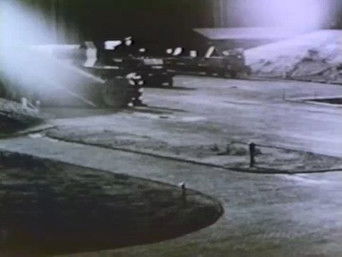Go back

Hitler's Secret Weapon
Episode number: 1
Overview: NOVA traces the development of Hitler's V-2 rocket through rare footage obtained from the National Archives—some never broadcast before on television.

The Hot Blooded Dinosaurs
Episode number: 2
Overview: If you were a dinosaur scientist, what would you do with a pile of fossil bones? How would you even start to put the giant jigsaw puzzle together, never mind discover anything about how these dinosaurs lived? NOVA explores the incredible world of the dinosaur scientist.

What Price Coal?
Episode number: 3
Overview: What is the price we are prepared to pay for coal? NOVA looks at the environmental and health safety issues raised by the government, industry, and the victims.

The Sunspot Mystery
Episode number: 4
Overview: NOVA explores the research on the 1976 drought in the western United States which led some solar scientists to discover the link between weather patterns and the 11 year sunspot mystery.

The Plastic Prison
Episode number: 5
Overview: NOVA follows the lives of three boys who have combined immuned deficiency—a disease that leaves its victims with no immune system.

Incident at Brown's Ferry
Episode number: 6
Overview: NOVA recreates March 1975 at Brown's Ferry, an Alabama nuclear power plant—the largest in the world—that suffered a seven-hour fire which came very close to developing into a major public disaster.

Bye Bye Blackbird
Episode number: 7
Overview: NOVA looks at blackbirds, their winter habit of nesting in the millions, and the destruction they do to crops.

The Pill for the People
Episode number: 8
Overview: NOVA profiles chemist Russell Marker who made the birth control pill possible by discovering a synthetic substitute for the hormone progesterone.

The Gene Engineers
Episode number: 9
Overview: NOVA explores the history of genetic engineering and the possible risks and benefits of this area of research

The Human Animal
Episode number: 10
Overview: NOVA investigates the controversial theory of Harvard University biologist E.O. Wilson, that many aspects of human behavior are genetically determined.

The Wolf Equation
Episode number: 11
Overview: In the winter of 1976-77, 80 percent of the wolf population in Northwest Alaska was the target of aerial hunts. Although the area is roamed by the Western Arctic caribou herds—a natural predator of the wolf—the caribou population has been steadily decreasing in number. NOVA examines how the Dept. of Fish and Game is handling the the problem of wolf control.

The Dawn of the Solar Age
Episode number: 12
Overview: Solar energy is increasingly popular as a home heating source. But only recently has it been seriously considered as a source of industrial power. NOVA looks at this new industrial approach, such as the use of a huge windmill in Ohio, giant machines that may generate electricity from the heat of the tropical seas or from the motion of waves, and an orbiting solar power station able to beam microwaves to earth.

The Business of Extinction
Episode number: 13
Overview: NOVA explores the huge international illegal trade in animals, penetrates the thriving underworld of smugglers and assesses the effects on vanishing wildlife.

The Red Planet
Episode number: 14
Overview: NOVA traces 300 years of speculation, investigation and discovery that have centered on Mars—particularly the theory that the planet could support life. Questions raised by NASA's 1976 Viking mariner missions about how the vast canyons were formed are also explored.

Tongues of Men (1)
Episode number: 15
Overview: In part one of this two-part exploration of the diversity of world languages, NOVA examines how and why the bewildering confusion of languages came about.

Tongues of Men (2)
Episode number: 16
Overview: In part two of this two-part series on the diversity of language, NOVA explores how man has coped with the confusion of language and asks if the growing acceptance of English is the answer.

Linus Pauling: Crusading Scientist
Episode number: 17
Overview: NOVA profiles Linus Pauling—the only person to have received two unshared Nobel Prizes for his work in nuclear weapons.

Across the Silent Barrier
Episode number: 18
Overview: NOVA explores the different means by which hearing-impaired people have learned to penetrate the world of the hearing by visiting with Kitty O'Neil—a woman record-holding speed car racer; Frances Parsons, an advocate of hearing-impaired persons' rights; and workers at Silent Industries—a factory in Los Angeles founded by a deaf man.

The New Healers
Episode number: 19
Overview: NOVA explores the delibitating diseases that are often caused by poverty and follows two paths to health care in Tanzania and the United States.